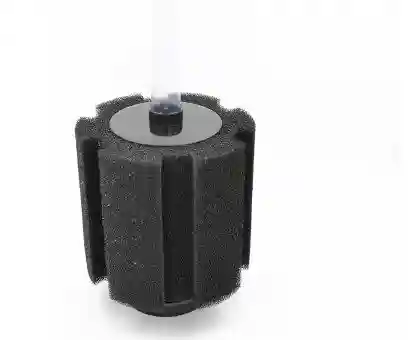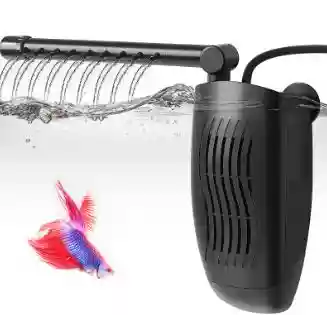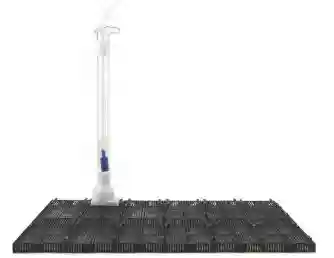Betta fish come from Southeast Asia, living in calm waterways that go through rice fields, still ponds, and slow-moving streams. Betta fish have developed extraordinary changes that help them live in places where the water is still or barely moving. The labyrinth organ in Betta fish is one of their most attractive traits.
It lets them breathe air from the atmosphere. This change is significant for their life in water, which doesn’t have much perspective. Because of this, Betta fish have learned to live in places with low air, making them very tough. Figuring out where Betta fish come from makes you consider adding a screen to their tanks. Lets dive in and find out does betta fish need a filter?
The Benefits Of Using A Filter
- Water Quality: Filters eliminate dangerous chemicals like ammonia and nitrite, keeping the water safe and stable for Betta fish.
- Toxin Reduction: Filters eliminate waste and organic matter, preventing toxic chemicals from building up and killing fish.
- Debris Removal: Filters catch debris in the water, keeping it clean and friendly.
- Oxygenation: Filters improve the flow of oxygen at the water’s surface, which helps Betta fish breathe.
- Less Water Changes: Filters lower the number of times water needs to be changed, making upkeep easier to handle.
- Consistency: Filters create a stable environment, which lowers the chance that the water quality will change.
- Ease of Care: Filtration makes tank cleaning more accessible, so aquarium users who don’t have much time can use it.
- Biologic Filtration: Filters help good bacteria grow, which improves the nitrogen cycle and the health of the water as a whole.
Can Betta Fish Thrive Without a Filter?
People who like aquariums have differing views on whether Betta fish can do well without a filter. Betta fish are naturally designed to live in water that doesn’t move or is still where they come from in Southeast Asia. Their maze structure lets them get to the air in the atmosphere and stay alive in places with little oxygen. Based on this change, Betta fish might not need the water movement screens given.
Betta fish can live without a filter, but some problems come up when they do. In tanks without filters, keeping the water clean is very important because there is no mechanical help to eliminate waste and toxins. This means that the water needs to be changed more often, and the factors of the water need to be closely watched, which makes the care schedule more difficult.
With filtering, the water quality in smaller tanks can stay relatively high, which is very bad for Betta’s health. Betta fish can do well without a filter, depending on their tank size, the number of other fish in the tank, how they are fed, and how often they are cleaned. It is possible, but it needs committed and careful care, which shows how important it is to be a responsible owner and ensure these fantastic fish have a healthy environment.
Factors To Consider
- Tank Size: The need for a filter depends a lot on the size of your Betta fish tank. Larger tanks are more stable and can work better with setups that don’t use filters.
- Bioload: The bioload of tankmates affects the amount of filtering that needs to be done. More fish in the tank means more waste, so you might need a filter.
- Maintenance Commitment: Think about how much time and work you’re willing to put into taking care of your tank. Filters reduce how often the water needs to be changed, so they’re suitable for people who only have a little time to do maintenance.
- Water Testing: In filterless tanks, you must often test the water to monitor the quality and ensure your Betta is healthy.
- Feeding Methods: The right way to feed animals helps control the amount of waste they make. Refrain from overfeeding, as too much food can cause problems with the water quality in setups without filters.
Does Betta Fish Need A Filter? Filter Types For Betta Fish Tanks
If you want to use a filter in your Betta fish tank, you must ensure you get the right kind that fits the needs of these beautiful fish. Because they like quiet water and have delicate fins, betta fish do best when their filter system is set up to make the water move slowly. Here, we look at a few filters that can be used in Betta fish tanks.
1. Sponge Filters

Many people who like Betta fish choose sponge screens for several reasons. They do excellent bacterial and mechanical filtering while keeping the water flow slow. There are good bacteria living in the sponge material. These bacteria help the nitrogen cycle and break down dangerous ammonia and nitrite. With these air-driven filters, you can change the flow rate so that your Betta doesn’t have to deal with strong currents that could stress it out. Sponge screens are great for Betta fish tanks because they can be used cheaply in many ways.
It’s easy to clean, operates quietly, and encourages beneficial bacteria to break down waste. Recommended for tank sizes between 20 and 40 gallons
2. Hang-on-back (hob) Filters

Hang-on-back screens are prevalent in the tank field because they are easy to set up and work well. But when you buy a HOB filter for your Betta, it’s essential to get one with flow settings that you can change. Some HOB filters may move water around a lot, which could make your Betta fish nervous. For your Betta’s comfort, look for types that let you turn down the flow to a low level. These filters usually do mechanical and biological filtration, and they can hold different types of filter media.
3. Canister Filters

People know that canister filters are better at filtering and can hold more filter media. Although they are great for cleaning water, they can be challenging for Betta fish owners because the water can flow quickly. On the other hand, some container filters have flow controls that let you change how the water moves. If you choose a container filter, make sure it has this feature and pick one that is the right size for your Betta tank.
4. Adjustable Flow Filters

Some filter types are made with Betta fish in mind and have flow settings that can be changed. In addition to filtering the water, these filters let you change the water flow to suit your Betta’s tastes. Because the flow rate can be fine-tuned, these filters are great for Betta fish owners who want filtration benefits without risking their fish’s comfort.
Water goes through three filter stages:
- Mechanical filter cotton: It Grabs debris.
- Biological filter cotton: It enhances water quality by filtering more particles.
- Ceramic rings: Boosts water quality and fish survival.
After filtering, clean water is pumped out through the spray bar above.
Pro Tip: If your internal filter stalls, clean the motor, let it dry, then reinstall the filter box to get it running again.
5. Undergravel Filters

Undergravel screens remove biological waste from the tank by being put under the ground. They support the growth of good germs and help keep the cleanliness of the water. They don’t make strong water currents used in Betta fish tanks. If you choose an under-gravel filter, ensure it fits in with the rest of your tank and doesn’t get in the way of your Betta’s room.
Advantages of Undergravel Filters
- Affordable: Setting up and maintaining under gravel filters won’t break the bank.
- Space-saving: They’re small and don’t clutter your tank.
- Proven: Many pet stores use them for a reason.
Disadvantages Undergravel Filters
- Delicate Bacteria: These filters depend on oxygen-dependent bacteria. Disrupting the tank’s setup or cleaning too often can harm these bacteria, affecting the tank’s stability.
- Clear Water Challenge: Mechanical filters outperform under gravel filters in removing debris. They struggle with big messes; you’ll need to clean more.
- Noisy Pumps: Cheap pumps can make your tank noisier.
Conclusion
One size does not suit all when it comes to whether or not Betta fish need a filter. Betta fish are used to living in still, low-oxygen water, but screens make it easier to keep the water clean, add oxygen, and care for the fish. Using a filter or not depends on how your tank is set up, what other plants are in it, how often you clean it, and how you filter the water. Finding the right mix between the Betta fish’s natural traits and the benefits of filters is essential for keeping them healthy and growing.





Leave a Comment
You must be logged in to post a comment.